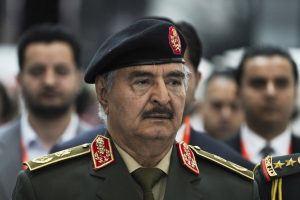IntelBrief: Libyan Warlord Exploits Sudan Crisis
newsletter via Feeds on Inoreader 2023-05-23
Summary:

The post-dictatorship experiences of both two large countries in North Africa, Libya and Sudan, have been converging over the past several years. Deposing longtime Libyan dictator Muammar Qadhafi in 2011 and Sudanese military chief Omar Hassan al-Bashir in 2019 failed to produce peaceful transitions to unified civilian rule. Libya remains divided by rival administrations based in Tripoli in the west and Benghazi in the east. In both Sudan and Libya, military and militia-backed leaders in both countries have refused to implement U.N.-brokered agreements to cede power to civilian rule or to hold elections, apparently perceiving that stepping out of their positions would render them vulnerable to prosecution, retribution, and loss of wealth. In Sudan, major fighting – still ongoing amidst the wreckage of several cease-fires – broke out in mid-April between the two top military leaders of Sudan – General Abdul Fattah al-Burhan, who commands the Sudanese Armed Forces, and General Mohammed Hamdan Dagalo (widely known as “Hemedti”), who leads the paramilitary Rapid Support Forces (RSF). The fighting between the two forces appears to have no realistic conclusion other than the defeat and exile of one or the other. Libya has been plagued by similar armed conflict; in 2019, the eastern-based strongman, Field Marshal Khalifah Haftar, leader of the Libyan National Army (LNA), sought but failed to unify the country by force, despite backing from Russia, the United Arab Emirates (UAE), and Egypt. Haftar and his allies in eastern Libya have since – with limited success – turned to political means to try to gain control over Tripoli and the rest of western Libya.
As tensions between the Sudanese army and the RSF heightened during March and April, Haftar saw brewing conflict in Sudan as both a threat and an opportunity. Conflict could threaten his strategic and economic arrangements in Sudan if his key Sudanese contact, Hemedti, were defeated. Yet, Haftar could increase his value to two of his powerful backers, Russia and the UAE, if he could serve as a conduit through which to help Hemedti prevail. Haftar, as well as his outside backers, depend on Hemedti to protect their lucrative trade, smuggling, and investment arrangements in Sudan. According to Jalel Harchaoui, a political analyst and an associate fellow at the Royal United Services Institute, “The Haftar family cares about the survival of illicit trade networks that exist between Sudan and eastern Libya…For the first time since 2014, Khartoum is a problem for Libya. Everything that is connected to the south might have to be altered [if Hemdti is defeated] and who knows what political change will come out of it.” Fuel, Captagon (the stimulant drug produced extensively in war-torn Syria), hashish, gold, and stolen cars are among the illegal goods smuggled in and out of Sudan and Libya. Haftar also seeks to benefit strategically by helping the RSF, in the event that Haftar was to engage in further combat with his domestic foes; Hemedti reportedly sent some RSF fighters to Libya to fight alongside Haftar’s LNA during his armed effort to capture Tripoli in 2019, according to regional sources. Similarly, Russia and the UAE have looked to Hemedti to further their efforts to secure access to Port Sudan, a potential springboard for both Abu Dhabi and Moscow to extend their influence in the Red Sea, the Horn of Africa and beyond. The Wagner Group has cooperated with Hemedti on gold mining and other commercial operations in Sudan. The UAE has supplied the RSF with military equipment and, in partnership with key UAE ally Saudi Arabia, looks to Sudan as a potential source of secure food supplies.
Gearing up to help Hemedti, Haftar’s LNA reportedly helped prepare the RSF for battle as tensions between Hemedti and Burhan rose. Days before the Army-RSF fighting erupted, one of Haftar’s sons, Sadeeq Haftar, was named the honorary president of one of two big Sudanese football/soccer teams, flew to Khartoum to announce a $2 million donation to the club, and subsequently visited Hemedti at his home. Haftar also ordered the arrest of a deputy of Musa Hilal, a Sudanese militia commander who is a bitter enemy of Hemedti. Hilal’s forces were responsible for inflicting heavy losses on Wagner Group mercenaries in the neighboring